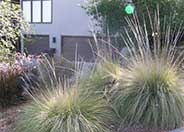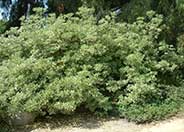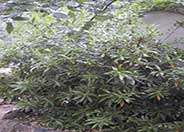
Common name:Soap Aloe, African Aloe
Botanical name:Aloe maculata
This succulent plant will grow about 2' high and has large, white-spotted green leaves with orange, pink, and red flowers that bloom in spring and fall. Leaves may get a red tinge in colder weather. Somewhat cold sensitive.

Common name:Deer Grass
Botanical name:Muhlenbergia rigens
The Deer Grass is a warm season perennial that forms dense clumps from the base. The spike-like flower stalks grow 3' tall and this grass has striking foundation form. The Deer Grass is native to California and needs watering once or twice a month after it has been established. The more water it has, the greener it is.
Maintenance Tips
Muhlenbergia rigens is a dense grass with a dome-shaped structure arching in all directions. It is commonly referred to as Deergrass. The foliage can reach 3' tall and 5' wide with flower blooms that emerge in the spring and summer 18" above the foliage. This grass requires almost no maintenance if it is planted in its ideal conditions. A sunny location, well-drained soil, and the space to reach its mature size will ensure that it thrives without having to prune for size or shape. It is common to cut back perennial grasses very hard in the winter to prune off the old spent flowers. If you are planning on winter pruning, it is best to wait until you see some new foliage emerge so the newly emerging leaves can cover the cuts quickly.
Common name:Variegated Tobira
Botanical name:Pittosporum tobira 'Variegata'
This variegated evergreen shrub or small tree has creamy margins on its gray green leaves. In spring, clusters of small, cream-colored flowers appear with the fragrance of orange blossoms. Variegated Tobira is often used to brighten shaded areas.

Common name:Kanooka Box, Water Gum
Botanical name:Tristaniopsis laurina
This slow growing, evergreen, multi-trunked tree is 20' tall and 10' wide. It has a dense, rounded crown with yellow flowers that bloom in late spring, and attractive leaves and bark. It requires regular watering.
Designer: N/A
Photographer: GardenSoft
Incorporate compost 6" into your soil to retain water, reduce compaction, feed earthworms, and provide valuable nutrients to your plants.
Develop healthy soil for plants that are vigorous and naturally pest-resistant.